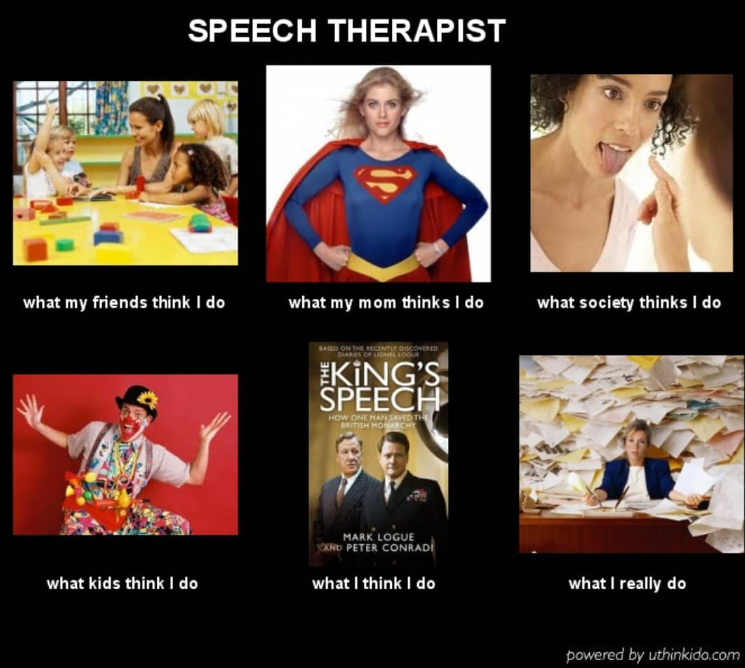You've just scored an interview for a speech-language pathology (SLP) job!

Before you can help clients find their voice, you’ve got to find yours — in the interview room.
SLP jobs require:

Strong oral and written communication

Empathy

Adaptability and flexibility

Problem-solving skills
Discover 4 interview questions you’re very likely to get as a new speech-language pathologist and ace your interview!
1. "Why did you become a speech-language pathologist?"
They want to know what drives you to help others — and whether you’re aligned with their values.

How to Answer:
Show awareness of what the role involves and what you bring to it
Share what your passions and interests are
Sample Answer:
“I was drawn to speech pathology because I enjoy helping people build the skills to express themselves confidently. I find it rewarding to support people across the lifespan — from early communication in children to rehab for adults. It’s a field that blends science, creativity, and human connection, which aligns well with my strengths and interests.”
2. “Tell me about a time you worked with a challenging client or family.”
They want to understand if you can stay calm and professional under pressure, and if you can problem-solve.

How to Answer:
Use the STAR method (Situation, Task, Action, Result)
Highlight how you maintained professionalism and adapted your approach
Sample Answer:
"[Situation:] During one of my placements, I worked with a young client whose family had different expectations from our therapy goals. Initially, there was some frustration.
[Task:] I set up a meeting to clarify goals and listen to their concerns.
[Action:] Together, we adjusted the plan to include more home-based strategies and activities, [Result:] which helped build our trust and improved consistency across settings.”
3. “How do you stay up to date with best practices in the field?”
They want to know if you're a lifelong learner. The field of SLP is constantly evolving, and staying up-to-date helps you provide the highest quality of client care.

How to Answer:
A strong answer mentions a mix of:
Professional development (e.g., conferences, workshops, webinars, courses)
Trusted sources (e.g., research journals, American Speech-Language-Hearing Association [ASHA], podcasts)
Peer learning (e.g., supervision, informal networks, online forums)
Sample Answer:
“I keep a record of articles that I've read, and I attend online webinars to keep up with evidence-based practices, resources, and strategies. I also connect with professionals on LinkedIn and informal networks to maintain my knowledge and skills in the profession."
4. “How do you collaborate with other professionals?”
 Photo by Parabol | The Agile Meeting Tool on Unsplash
Photo by Parabol | The Agile Meeting Tool on UnsplashThey want to know how well you can work together with others. Great therapy doesn't happen solo. It takes a team!
How to answer:
Give a real and specific example of a previous experience
Show you're proactive, understand others’ roles, and are focused on shared outcomes
 Quiz
Quiz
At the interview, you've been asked:
"Can you give an example of how you would collaborate with other professionals (like teachers, psychologists, or occupational therapists) to ensure consistent and effective support for a shared client?"
Which of the following is the best response to demonstrate strong collaboration skills?
A. "I make sure to adjust my therapy approach slightly if needed, but prefer to work independently so we can keep making quick progress without getting caught up in long discussions."
B. "I proactively reach out to the team to clarify everyone’s role and goals for the client. Then, I discuss how we can align our strategies, so the client gets consistent support across different settings."
C. "I focus on keeping the team updated and invite their feedback before making any major changes to my therapy plan, ensuring we’re all on the same page."
D. "I concentrate on delivering the best possible therapy in my own sessions, trusting that other professionals will manage their parts effectively."
Quiz
Which answer is best?
Take Action
Being an SLP means using your skills to make a real and meaningful impact to the lives of others.
 Photo by Brett Jordan on Unsplash
Photo by Brett Jordan on UnsplashGood luck with your interview!
Your feedback matters to us.
This Byte helped me better understand the topic.
